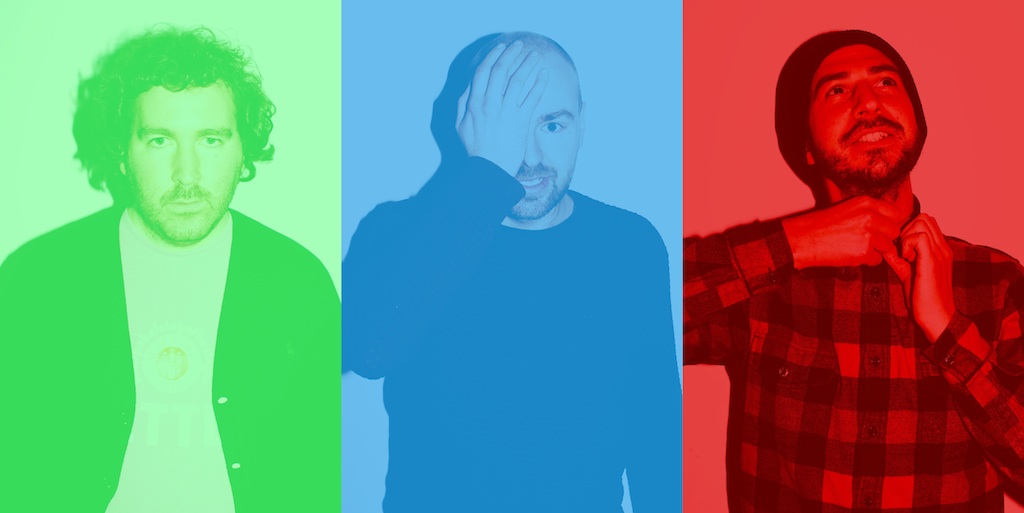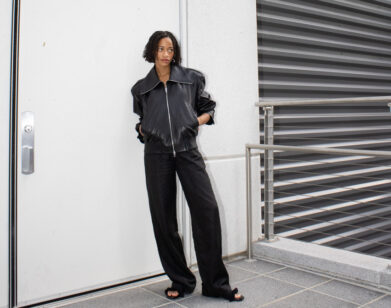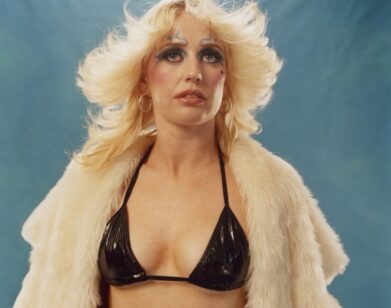Greco-Roman Grows Up

ABOVE: JOE GODDARD, ALEXANDER WALDRON, AND DOMINIC MENTSH
Greco-Roman is not a record label. It releases records—notably EPs by Baio and Disclosure—but the men behind it prefer to think of themselves as a collective. “Sometimes we’re a record label, sometimes we’re a party in London and Berlin, sometimes we’re a DJ team,” explains co-founder Alexander Waldron. “We quite often only do one record with one artist, so it’s quite a loose arrangement,” he continues. Formed by Waldron, his DJ partner Joe Goddard (who is also in Hot Chip), and their former colleague Dominic Mentsh, Greco-Roman is what happens when London’s mythologized rave culture grows up.
Earlier in the summer, the collective released Goddard’s solo EP, Taking Over, named for the high elicited by the dance-floor. Next week, they will release their first ever compilation, a double-disc set titled We Make Colourful Music Because We Dance in the Dark featuring the below song, “Boiling,” by Disclosure. Interview recently spoke with Mentsh, Waldron, and Goddard about modern DJing and where to go from here.
EMMA BROWN: How did the three of you meet?
JOE GODDARD: We all met working at Island Records in South West London, which obviously has an amazing history. We were all drawn to it. That’s not really what it is now—[it’s] a pale imitation of its former glory. [laughs] But I had a good time and I met lots of really good people—Alex and Dom and various other characters. Myself and Dom were the kind of assistants in various things; Dom was working upstairs in A&R, and I was working with the marketing department and in press for a little while. We used to occasionally get five minutes to hang out in the photocopier room and talk about music: hip-hop and dancehall and reggae. We bonded over those things. Alex had worked for the company previously and then he came back and worked for them again and became one of my bosses. [I] really got on well with him from the start.
ALEXANDER WALDRON: We started DJing together. Not what most people would do in that situation, but we just had fun. That’s actually how Greco started. Me and Joe called ourselves Greco-Roman. That was our DJ name because we thought we were like two wrestlers. Then we decided to do a party together. We thought we needed one more person to help us do it. The obvious person, a mutual friend that we both had, was Dom.
BROWN: Do you remember your first impressions of one another?
DOMINIC MENTSH: I thought Joe was really safe. I was really unsure about Alex. [laughs]
GODDARD: Alex was my boss, so Alex was kind of scary. [laughs]
WALDRON: Oh, fuck off.
BROWN: What makes Greco-Roman different from a traditional music label?
WALRDON: We’ve all got [other] jobs. I work for a record label; Joe’s obviously in a band, and Dom’s a music supervisor. It’s challenging, but I think it changes the focus of it. Instead of the focus being to make money and earn a living, we do this because we love it; we love the projects we take on. The way we sign things is that one of us will find something and send it to the other two and only if the other two are into it will we do it. I often refer to it as my elaborate posh hobby. [laughs] It was my day job for the last two, three years. It’s less enjoyable when you really have to rely on it. It’s really hard to make money as a small record label, or collective, or anything these days. The more that we had to rely on the company to make money, to pay rent and stuff then the less I remembered the reasons why we started it.
BROWN: When you DJ at clubs now, how has the audience changed from when you first started?
GODDARD: They’re a lot younger than us now. A lot. [laughs]
WALDRON: When we first started DJing together, we were a complete shambles, really. We could mix, but we didn’t often. We played all sorts of stuff—gram records, old rock-‘n’-roll, jungle, hip-hop, and techno—we just threw it all together. That was our style for a while. When we do Greco-Roman nights, we try to play all those types of music, but it’s more of an arc: we start with hip-hop, then we move into house. We play that over the course of eight hours—we used to do it in the space of one hour. It was quite a shambles but I think we pulled it off, somehow. It seemed to work in the beginning. But we would never do that now, I don’t think we could get away with it. The whole world seems to play house music at the moment.
MENTSH: The early parties, it was our mates, and everyone had this kind of hedonistic approach to it. The music was obviously important—really important—but it was our tastes and our friends trusted that.
BROWN: What do you think the role of the DJ is, now that you can just plug in your computer and press play?
GODDARD: It’s definitely different. One of the big things right now is the DJ is a spectacle, isn’t it? You have the enormous light show, smoke, explosions, and fire. There’s a dude with a USB stick playing somewhere in there, but the spectacle is created out of lights and lasers and whatever. The original idea of DJing—being a shadowy figure in the corner while people were having a party—is not the one that makes money and is massively popular internationally.
WALDON: I think the role of the DJ is the same. He or she is meant to play great records and inform the dance floor. We just feel like people don’t really do that anymore. As Joe said, it’s become a lot more formulaic.
MENTSH: But there’s also that point that everyone makes, that with technology now, everyone’s a DJ. Loads of kids are springing up in these clubs that aren’t—it’s not right to say aren’t particularly good, but it’s just kind of hidden. [Joe and Alex] mix vinyl and the art of being able to play different genres on vinyl, it shows what a real DJ artist is about. DJing is not just a technical ability—being able to mix something—DJing is all about selection. Half the fun for me, going to a club, is when Alex and Joe are playing music and I’m going, “What the hell is this? This is amazing!” They might tell me it’s a record from ’76 or a record from now. It’s about the selection; when they choose to play it and how they take the crowd on that journey. Rather than just a kid plugging in a USB and being able to download the latest tunes of Beatport.
BROWN: How do you find new music?
MENTSH: I just download the latest people off of Beatport. [all laugh]
GODDARD: I rip it off Dom. [all laugh]
BROWN: Do you think the album is an archaic format?
WALDRON: I think it’s harder now to make a great album than ever before, because the concept doesn’t do as much. Kids get on their iPhone and they shuffle and it’s all about the single and the hit. I’m on both sides of it. I love the thought of having loads of music lots of the time—keeping fresh and keeping rhythm. [When] you’re going away spending two, three years making an album, sometimes you come back and the environment and the audience has shifted, because it’s so quick nowadays. It’s quite problematic. [But] when you get an album that really connects, when you really want to take the time to listen to it, that’s the reason why the artist has done the art. It is to sit there and listen to those tracks as body of work, uninterrupted. When you do hear one of those now, it’s really exciting.
BROWN: What are some recent albums that you’ve heard?
GODDARD: In terms of sitting down and listening to an entire record, I really found I was doing that a lot with the Joanna Newsom album.
BROWN: Is there someone who would be the dream Greco-Roman artist that you would love to work with?
WALDRON: I would love Green Velvet.
GODDARD: Green Velvet would be amazing.
WALDRON: There’s two sides to Greco-Roman. One is the dark sort of side, because it started in partying and from DJing. The other thing that we love is kind of experimental pop music—sort of oddball, electro-pop music. A lot of the stuff we release, they’re songs rather than club tracks. They’ve got full vocals, and often they’re arranged as songs rather than DJ tunes. My choice would be Green Velvet because he makes these banging techno tunes and sings these really catchy, poppy, well-produced vocals over the top. For me they work as pop records as well as club records.
GODDARD: I would probably go hip-hop with Kool Keith. If you could have a casual Green Velvet beat with Kool Keith record on it, that would be good. Kool Keith kind of fits in with Greco because he’s on the outside of hip-hop—left-field, mad, made loads of weird records.
BROWN: I know you have a compilation coming out soon.
MENTSH: Do you know about the whistles? We’re releasing the compilation on CD, but there’s also a limited edition, engraved rave whistle that comes with it. We’re doing 100.
WALDRON: We can send you a photo—it’s real. We all wanted whistles because we can use them at our parties and we got the little Greco-Roman logo engraved inside.
GODDARD: It’s a part of hip-hop, rave culture. But moving on from whistles, in the future we want to release Greco-Roman wine. Our friends are getting too old to go clubbing, but they will still have to buy our wine if we release it.
MENTSH: The future of Greco-Roman will basically be a form an eating club. That means our friends will come hang out with us. They don’t go to clubs anymore.
BROWN: Do you have a vineyard in mind yet?
GODDARD: Yeah, probably in the Napa Valley.
WALDRON: “Waldron Vineyard.”
GODDARD: No. Greco-Roman Estate in Napa Valley.
MENTSH: It should be Greek wine.
GODDARD: It’s called Cretian wine, in Crete. It burns the back of your throat.
FOR MORE ON GRECO-ROMAN, VISIT THEIR WEBSITE. YOU CAN PRE-ORDER WE MAKE COLOURFUL MUSIC BECAUSE WE DANCE IN THE DARK VIA AMAZON.






